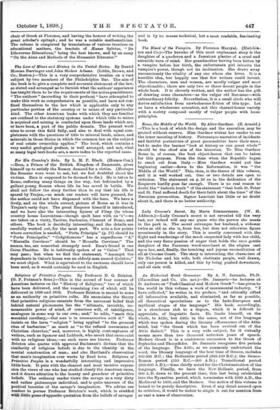In Historical Greek Grammar. By A. N. Jannaris, Ph.D. (Macmillan
and Co. 25s. net.)—Dr. Jannaris—he lectures at St Andrews on "Post-Classical and Modern Greek "—has given to' the world in this volume a work of monumental industry. " Iv have collected," he writes in his preface, "and critically sifted all information available, and eliminated, as far as possible., all theoretical speculations as to the Indo-European and mythical stages of the language." His book, accordingly, is a storehouse rich to a degree, which it is difficult to• appreciate, of linguistic facts. He limits himself, on the whole, to Attic, but Attic in the sense, not of the language which was spoken during the literary efflorescence of the Attic mind, but " the Greek which has been evolved out of the Attic dialect." This is a very wide subject, for it virtually means more than two thousand unbroken years of speech. Modern Greek is in a continuous succession to the Greek of Sophocles and Thucydides. Dr. Jannaris recognises five periods of the language. The Attic, as we commonly understand the word, the literary language of the best time of Greece, includes 500-300 B.C. ; the Hellenistic period (300-150 B.C.); the Grieco- Roman period (150 B.C.-300 A.D.) ; Transitional period (300-600 A.D.),—time chiefly noted for the Christianisation of the language. Finally, we have the New-Hellenic period, from 600 A.D. down to the present time, this last being subdivided into the Byzantine period, which terminates with 1000 A.D., the Medieval to 14,50, and the Modern. Our notice of this volume is bound to be purely descriptive. Even if any detail seemed open to criticism, it would be unfair to single it out for mention from so vast a mess of observation.






































 Previous page
Previous page